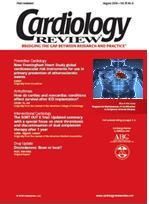Publication
Article
Cardiology Review® Online
ABC's role in the community: A few words from the association's new president
Author(s):
As president of the Association of Black Cardiologists (ABC), I am honored that my colleagues have the confidence to entrust me to lead such a great organization. Throughout the history of the ABC, many talented individuals have held the title of president, and I will do my best to live up to the high standards that have been previously established.
There is a wealth of ideas for future clinical programs, community initiatives, continuing medical education (CME), and research. It is crucial that we further develop ways to reach out to the community. Despite our many successes over the years, our work is not even close to being completed. This year marks the 40th anniversary of Dr Martin Luther King's assassination. I reflect back on his quote, "Of all forms of inequality, injustice in health care is most shocking and inhumane." I am sure that if Dr King were alive today, he would not be satisfied with the current status of health care in America.
The new executive committee has focused on ways to eliminate existing health care disparities for African Americans, while improving the overall standards of health care for Americans of all races and cultures. In the newest version of the ABC video,* there is an image of a sleek spaceship being readied on a launch pad. This vehicle represents the ABC, and its fuel is the commitment and support of our members, health-related government agencies, and industry partners. Once fueled, our organization will be enabled to fulfill its mission.
The ABC is part of a larger community, in which health care disparities are real and continue to exist. We have an excellent reputation for our ability to produce quality community programs for laypeople and educational programs for physicians. These programs target men, women, and children of all ages, with a goal of increasing individual and collective health awareness. We would like to establish new programs that will reach people in their daily environments, such as the church, the barbershop, the hair salon, and, most importantly, the schools. We hope to explore new areas of partnership that will facilitate our ability to reach out to the general public.
Some of our ideas include collaborating with large box retailers, who have established "minute clinics" in their stores. We would like to partner with large movie theater chains that could show the ABC video as part of the previews before the feature presentation. We are also looking to create a community health advocate program, in which we would partner with local corporations to educate their staff on how to improve their cardiac health awareness.
As you know, the incidence of childhood obesity, diabetes, and hypertension is increasing disproportionately in African Americans compared with the general population. This "fast food or video game" generation is less active and less physically fit than ever before. If we do not reach out and make an early impact, the statistics on cardiovascular disease quoted in today's literature will be eclipsed by those observed by our children. We must attempt to correct certain behaviors at their earliest stages. The ABC is committed to partnering with our sister organizations and industry to create programs that will address risk-factor development in children before cardiovascular disease can manifest itself during young adulthood.
By exposing children to healthier lifestyle habits, we hope to promote the health care field in general. Most African American teenagers have never met a black cardiologist, particularly a female cardiologist. Over the past 10 years, the number of African American students applying to medical schools has declined. When I first joined the ABC 11 years ago, there were approximately 125 African American fellows in training programs across the country. That number is now approximately 80! Young adults need role models who will boost their confidence to pursue a career in medicine, particularly cardiology.
Our CME committee, which is headed by Dr Ola Akinboboye, is one of the strongest assets of the organization. We are accredited with commendation through 2011. This is the highest designation one can receive. Fewer than 10% of CME providers have this status.
The ABC has always enjoyed excellent relationships with our sister organizations. We would like to explore new ways to develop even stronger ties with these groups. We are currently in the process of developing the Mississippi Model of Cardiovascular Risk Reduction in collaboration with the American Heart Association, American College of Cardiology, and the National Black Nurses Association. The goal is to establish an effective, culturally-competent, community-based intervention model for cardiovascular risk reduction to be piloted in Mississippi over a 2-year period. If successful, this model can be employed in other communities across the country. Projects like this exemplify what the ABC is about, and I am proud to belong to this organization.
*To obtain a copy of the ABC video, contact
.






